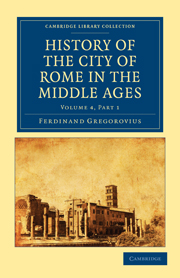CHAPTER VII
Published online by Cambridge University Press: 05 October 2010
Summary
After Gregory's fall the city of Rome resembled a deserted stage, which only tardily becomes peopled by insignificant figures. Not only the actions, but also the fall of a great man leave an influence behind which may be traced in a thousand ever-widening circles in the waves of time, until these circles finally lose themselves in space. Gregory's coffin was now surrounded by the men of the hierarchy, who had grown old and grey fighting in its defence, as the body of Alexander the Great in former days had been surrounded by his guards. Who was to inherit the spiritual empire? Was it to be overthrown by the petty passions of envy and ambition? Such would have been the case in a secular State; in the realm of priests, however, where there was no family dynasty to be founded, the actual heir was the hierarchical spirit which continued to subsist as an indestructible principle.
Gregory, on his deathbed, had designated four candidates for the forthcoming papal election: Desiderius of Monte Casino, Cardinal of S. Cecilia in Trastevere; Anselm of Lucca; Otto of Ostia; Hugh of Lyons. The wishes of the cardinals centred around Desiderius, a talented man of diplomatic duplicity, without force of character. The wealth of the abbot, the respect which he enjoyed among contemporary princes, his connection with the Normans, his very relations with the Emperor Henry made his election desirable.
- Type
- Chapter
- Information
- History of the City of Rome in the Middle Ages , pp. 261 - 314Publisher: Cambridge University PressPrint publication year: 2010First published in: 1896

